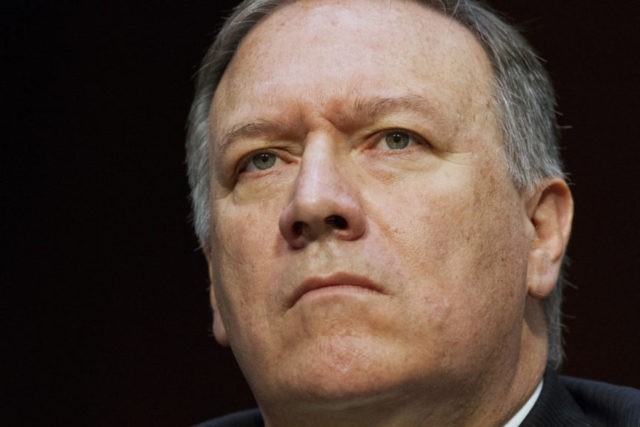WASHINGTON, DC — U.S. President Donald Trump’s administration has abandoned the “soft policy” that has allowed Russia to “act aggressively” towards the United States, Mike Pompeo, the nominee for Secretary of State, declared during his Senate confirmation hearing on Thursday, suggesting that the former commander-in-chief treated the Kremlin with leniency.
Sen. Bob Menendez (D-NJ), the ranking member of the Senate Committee on Foreign Relations hosting the confirmation hearing on Thursday, blasted Pompeo and the Trump administration as a whole for not being tough enough on Russia.
Democrats have long accused the Trump administration of colluding with Russia.
Pompeo testified on Thursday:
Russia continues to act aggressively, enabled by years of soft policy toward that aggression. That’s now over. The list of this administration’s actions to raise the cost for [Russian President] Vladimir Putin is long. We are rebuilding our already strong military and recapitalizing our nuclear deterrent. We have imposed tough sanctions and expelled more Russian diplomats and intelligence officers from the U.S. than at any time since the Cold War.
We are arming brave young men and women resisting Russian expansionism in Ukraine and Georgia. This list is much longer, and I’m confident I’ll have the opportunity to add to it today. But the actions of this administration make clear that President Trump’s national security strategy, rightfully, has identified Russia as a danger to our country. Our diplomatic efforts with Russia will prove challenging, but as in previous confrontations with Moscow, must continue.
Sen. Menendez said he believes that Pompeo’s remarks do not go far enough in condemning the Kremlin, arguing that the Trump administration fails to see Russia as a threat.
The senator grilled Pompeo on what he considers to be Trump’s cozy relationship with Russia, asking the nominee for the top diplomat post in the United States:
President Trump has repeatedly said that “getting along with Russia is a good thing.” Yesterday, he tweeted “Our relationship with Russia is worse now than it has ever been; there’s no reason for this.” And he indicated he would like to help Russia with its economy. What behavior, if any, has the Kremlin shown that indicates it wants to “get along” with the United States or our allies?
Pompeo replied:
I take a back seat to no one with my views of the threat presented to America from Russia and if I’m confirmed as Secretary of State I can assure you this administration will continue as it has for the past 15 months to take real action to push back, to reset the deterrence relationship with respects to Russia.
Sen. Menendez insisted that President Trump refuses to issue a “robust response” to the Russian threat, stressing the administration has failed to impose congressionally-mandated sanctions on Russia for the Moscow’s attack on U.S. elections.
Our relationship with Russia is worse now than it has ever been, and that includes the Cold War. There is no reason for this. Russia needs us to help with their economy, something that would be very easy to do, and we need all nations to work together. Stop the arms race?
— Donald J. Trump (@realDonaldTrump) April 11, 2018
Several analysts have criticized Obama for being too tolerant of Russian aggression during his tenure as president.
In an article published by the Washington Post in October 2017, Derek Chollet, the executive vice president of the German Marshall Fund think tank, wrote:
Did wishful thinking produce a failed policy, perhaps best symbolized by Obama’s glib dismissal of Mitt Romney’s tough talk on Russia during the 2012 presidential campaign? Or was it a reflection of the inherent limits of U.S.-Russia relations under Putin? The answer is a mix of both, which offers important lessons for the future that can be summed up this way: Don’t oversell, don’t chase, and take time to understand how Russia’s decline limits cooperation.
“The U.S. and the international community had a lot of powerful non-military options to raise the cost to Russia and make it more willing to stop killing Ukrainians,” NATO expert Jorge Benitez of the Atlantic Council told Business Insider. “Obama’s sanctions are so soft, some Russian legislators made fun of him and begged the U.S. to sanction them.”

COMMENTS
Please let us know if you're having issues with commenting.